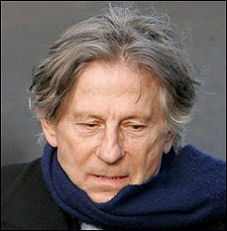The Telegraph‘s Matthew Moore reported this morning that Wikipedia administrators have blocked filmmaker Roman Polanski‘s Wikipedia page from being changed after an ‘edit war‘ broke out following the news of Polanski’s arrest two days ago in Zurich on a 31 year-old beef that has been forgiven, to some extent forgotten (save for Marina Zenovich‘s documentary about the case) and has been clearly withering on the vine and yellow with antiquity except in the heads of L.A. prosecutors and the online moral-vengeance crowd.
In other words, the same battle that happened here yesterday has been happening among Wikipedia posters and all over the web.
Polanski slammers on Wikipedia have apparently tried to amplify the matter into a much uglier and more pernicious thing than may be fairly warranted, and his defenders have tried to frame the episode within a realistic historical and sociological realm — i.e., one unmotivated by a curiously frenzied and tub-thumping moral outrage that seems to be about something other than just the late ’70s behavior of Roman Polanski, Samantha Geimer and Laurence J. Rittenband.
What is it that is preventing the Polanski haters from easing up about this thing? Unlike Michael Jackson, Roman Polanski didn’t invest tens of millions into constructing a child-luring fantasy realm called Neverland, which obviously allowed Jackson to take certain liberties. Polanski was, in 1977 and ’78, simply a brilliant obsessive with certain wounds and bruises and perverse inclinations who one night acted like a brute and a pig and probably damaged a young girl’s psyche, although apparently not to a great extent, to judge by her own statements about the incident.
The demons in Polanski that allowed for such behavior were almost certainly sired by his traumatic World War II Nazi-evading childhood and then further exacerbated by the slaughter of his wife and unborn son at the hands of the Manson family in 1969. Does this history excuse his abhorrent behavior in the case of a young teenager who, with the aid and assent of her mother, got herself into a situation that was way over her head? Of course not. Has Polanski suffered at all for his crime, apart from going to jail for 42 days in 1977? Of course he has. The crime has been haunting his head and heart for 32 years and it has defined the political and geographical limits of his life and career for same amount of time — more than half his adult life. He’s lived as a fugitive, a restricted man, a hider in the shadows — never a good thing for anyone in a spiritual sense.
But in the minds of the haters, Polanski hasn’t begun to suffer enough. They’re determined to lash him to the rack and keep him there. They want Pilgrim justice, flayings, black caps, thumbscrews, howls and clanging metal doors.
How do the haters not understand that forgiveness and letting go, particularly after decades of natural healing and the universe having moved on, is an essential tenet of a humane and compassionate philosophy/attitude? Especially when the victim herself has been saying “give it up” for years?
I wrote this morning that there seems to be something almost fetishistic about this case for some people — a weirdly lopsided and enduring sense of vengeance that they feel a need to pursue. There’s something oddly primal going on here. Some kind of metaphor they’re reading into it.
“Why, oh, why, do so many people go so rabid over this, and not thousands of other outrages and injustices?,” Glenn Kenny wrote yesterday morning. “[The] theory that it might have something to do with one’s feelings towards an older person, etc., could indeed be relevant. My own instinct is less charitable. [The revived Polanski episode] just gives people a chance to have a good long wallow in their own inflated sense of righteousness. You should enjoy, as they say.”
Mike in Seattle urged the haters to “please understand the concept of projection. All this righteous indignation is coming from you — not the case, not him, not anything except you. Projection. This is not about what Polanski did or did not do. It’s about you and your feelings toward some older person who did you wrong in your life. Please take responsibility for your feelings.
“What is this obsession that people, especially Americans, have for punishment and revenge?,” he went on to say. “Do these events all take place in a vacuum? Is there no consideration for what happened to this man only a few years before this incident? With his pregnant wife and child brutally murdered? It would seem as fresh and raw as yesterday. So to everyone who says he must pay, does this not get taken into account at all? When a soldier fresh home from some war goes PTSD nuts on his family, would we all say he needs to pay? Or would we say he needs help, and that he surely must have been temporarily insane? Why does Roman Polanski not get just a little of the same consideration? These events do not happen in a vacuum.”
The author Robert Harris, who wrote the adaptation of Polanski’s latest film, The Ghost, said that Saturday’s arrest struck him as “disgusting treatment.” French culture minister Frederic Mitterand contendedthat “a scary America” had “shown its face,” and said it “doesn’t make any sense” for the director to be “trapped” and “thrown to the lions, because of ancient history. [Polanski] has had a difficult life but he has been able to have a family life in France with a wife who loves him and children he has brought up with great care and attention.”
Polanski’s agent Jeff Berg, speaking on BBC Radio 4, echoed this sentiment, pointing out that Polanski’s director’s “psychological makeup” may have been adversely affected by the personal tragedies he’d endured, but that he’d moved forward in his career and personal life since the child rape conviction.




